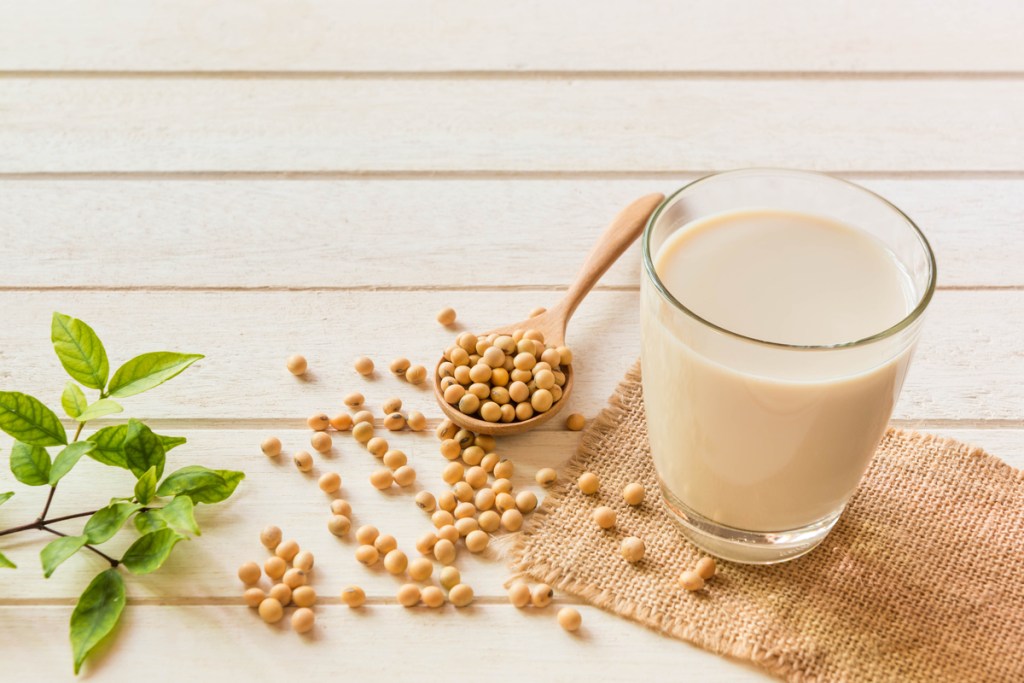
The vegan diet plan has a number of purported health benefits, with multiple studies concluding that a plant-based diet can aid in weight loss, reduce cholesterol, lower the risk of cardiovascular disease, and prevent and treat type 2 diabetes.
Although scientists stress that more study is needed on the topic, the evidence that does exist points toward plant-based diets playing a powerful role in health. Still, vegans still face one key question: How can vegans get enough protein?
Protein is a critical macronutrient that helps repair and build muscle and other tissue. While plant-based protein is available, it can be tougher to find than traditional animal protein. Fortunately, there’s more to the plant-based diet these days than celery and wheat germ. Here’s a look at some of the best plant protein products around.

Soy
Soybeans are a nutritional Swiss army knife for health-conscious consumers. Soy is inexpensive and comes in lots of different forms, all of which are naturally high in protein. Some options include:
- Soy milk: A vegan’s secret weapon. Simply replace your almond milk (one gram of protein per cup) or oat milk (three grams per cup) with soy milk (eight grams per cup) and suddenly you’ve made a serious dent in your protein problem.
- Tempeh: Made from fermented soybeans, tempeh is popular as a plant-based alternative to bacon and other foods. It’s also a winner because of the 31 grams of protein it contains per cup — more than the same amount of ham.
- Edamame: A cup of this popular appetizer provides 17 grams of highly snackable protein.
- Tofu: Known for its culinary flexibility and ability to absorb the flavors around it, a cup of tofu delivers a whopping 20 grams of protein per cup.

Nuts, seeds, and legumes
This may be the most well-known plant-based protein. They’re also among the most versatile and accessible plant proteins that can be incorporated into any meal of the day.
- Chickpeas: Think beyond the hummus. No matter the preparation, chickpeas are big hitters thanks to the 39 grams of protein they contain per cup. Hummus does indeed make for a protein-rich snack or appetizer, but it doesn’t end there. Chickpeas are also a common ingredient in pea protein, a vegan alternative to whey protein found in a wide selection of shakes, smoothies, and bars, which are easy ways to inject more protein into the diet.
- Nut and seed butter: These spreads make for a solid and versatile supplement to your plant-based protein intake. Per two-tablespoon serving, almond butter has about seven grams of protein, while cashew and sunflower seed butter both contain about six. The real king here is good old-fashioned peanut butter, with eight grams per serving.
- Peanuts: Peanuts are one of the most cost-effective vegan snacks, and you don’t have to scour a specialty foods store to grab them. This ever-popular snack comes in at 38 protein grams per cup, which is more protein than any other nut.
Plant-based “meat”
It wasn’t long ago that vegan versions of traditional meat certainly wouldn’t sway any meat lovers. That’s not the case anymore. New innovators have taken plant-based meat to new heights, and now there are a number of products on freezer shelves that will put animal protein even farther in the rear-view.
- Ground “beef”: It’s uncanny how closely some of these products resemble traditional ground beef. They’re a great source of protein too, with one Beyond Burger containing 20 grams of protein and one Impossible Burger containing 19.
- Vegan jerky: The Louisville brand of soy jerky comes in a variety of barbecue flavors and has a pretty satisfying chew. It also clocks in at around seven grams of protein per ounce, only two fewer than beef jerky, so it makes for a quick and easy protein boost.
- Sausages: Like ground beef, plant-based sausage is edging ever closer to the real thing. You’ll be surprised by its juiciness and familiar “snap” of the first bite. The Beyond bratwurst is will delight at your next barbecue, packing 16 grams of protein per link — about the same as traditional brats. It might be time to add an extra menu item to your Fourth of July cookout.
Plant-based protein is more than a fad — it’s a lifestyle change that is continuing to gain steam. In May 2020, a report from consumer group Nielsen found that demand for plant-based foods rose 264 percent during the height of the coronavirus pandemic. Also, more people are becoming vegan, with a study from Ipsos finding there were 9.7 million vegans in America in 2019 — up from just 290,000 in 2004.
As more people become vegan (or stay vegan after trying it), we’ll continue to see more and more innovation in the plant-based food industry. While we’re excited about where this cuisine is headed, we’re also pretty in love with the hundreds of options available today.
BlissMark provides information regarding health, wellness, and beauty. The information within this article is not intended to be medical advice. Before starting any diet or exercise routine, consult your physician. If you don’t have a primary care physician, the United States Health & Human Services department has a free online tool that can help you locate a clinic in your area. We are not medical professionals, have not verified or vetted any programs, and in no way intend our content to be anything more than informative and inspiring.



